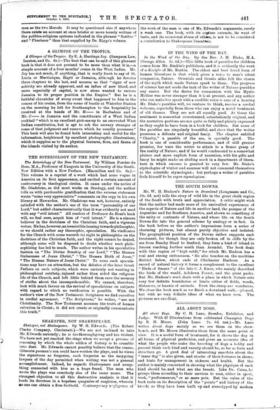IN THE WIND OP' THE DAY.
In the Wind of the Day. By the Rev. J. M. Blake, M.A. (George Allen. 3s. 6d.)—This little book of parables for children comes from Mr. Ruskin's publishers, and it is evidently the work of a disciple of Mr. Ruskin. The oldest and best loved form of human literature is that which gives a voice to man's silent companion, Nature. Orientals and Greeks alike felt the charm of the myth which made Nature speak to them. The progress of science has not made the task of the writer of Nature.parables any easier. But the desire for communion with the Mystic Mother was never stronger than it is at present, and any author who can make her speak with a credible voice is sure of a bearing Mr. Blake's parables will, we venture to think, receive a cordial welcome, especially from those who can enjoy a novel treatment of old themes. They are not all equally good. At times the sentiment is somewhat overstrained, ostentatiously original, and the narrative portions are not quite so fully and plainly expressed as they ought to have been in a book for children. But some of the parables are singularly beautiful, and show that the writer possesses a delicate and original fancy. The chapter entitled "Charity," a parable of the sea, is specially good. The book is one of considerable performance, and of still greater promise, for were the writer to attain to a firmer grasp of the reality of Nature, and if he would condescend to a somewhat plainer and more explicit form of narration, with his gifts and fancy he might make an abiding mark in a department of litera- ture in which success is granted to very few. Mr. Blake's etyfnologies of winter and summer will not commend themselves to the scientific etymologist ; but perhaps a writer of parables feels himself to be supra etymologiam.


















































 Previous page
Previous page